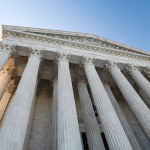The Arizona Court of Appeals handed property owners a crucial victory weeks ago in a ruling against Tucson’s policies of allowing homeless encampments on city-owned property. Following a decision against the city of Phoenix last year, the judges held that when Tucson officials refused to enforce anti-camping ordinances, and effectively encouraged law-breaking in areas that harmed neighboring property owners, they created a “nuisance” and can be held liable in court. The ruling sets a critical precedent not just in Tucson, but throughout Arizona, particularly given the state’s newly adopted Prop. 312, which protects landowners against cities’ willful refusal to enforce the law.
The story begins in 2024, when Arizona judges held that Phoenix created a nuisance by operating the nation’s largest homeless encampment on a region of downtown streets known as “The Zone.” Phoenix officials not only allowed over 1,000 people to live in tents on streets and sidewalks in The Zone—thus ruining local businesses and creating dangerous and unsanitary conditions for both residents and the homeless—but effectively declared that the law would not be enforced there. The result was an upsurge in crime, including arson and murder. A group of residents went to court, arguing that the city was operating a nuisance (a legal term that means an activity that substantially interferes with other people’s property), and won.
Shortly afterwards, Tucson residents filed suit against that city, which since 2019 had allowed the homeless population to live in tents in public parks and an area known as Navajo Wash. This tent city included makeshift toilets, open fires, and a rash of criminal behavior, including violent crime—all harming neighboring landowners.
The Tucson case differed from the Phoenix case in some important respects, however. For one thing, the city claimed that, unlike Phoenix, it was not actively encouraging people to live in Navajo Wash. Instead, it adopted what it called a “three tier” system for homeless encampments. “Low-priority encampments” were allowed to remain, with the city providing trash cleanup, whereas “high problem” encampments were required to vacate within 72 hours of a city notice. This, Tucson claimed, proved that it wasn’t actively fostering the encampments as Phoenix had done. A trial judge agreed, holding that the city could not be held liable for the nuisance.
But in a unanimous ruling on May 25, the Arizona Court of Appeals reversed that decision. Under state law, it said, a nuisance is “anything injurious to health, indecent, offensive to the senses or an obstruction to the free use of property that interferes with the comfortable enjoyment of life or property by an entire community or neighborhood,” and the Navajo Wash encampments clearly qualified. And the “three tier” system only proved that Tucson “consent[ed] to camping in the Navajo Wash…. It allows the homeless population to continue to return to the Navajo Wash after each abatement and clean-up…. Because the City knew the activity of homeless camping in this location was being carried on and … repeatedly and continually caused a nuisance, yet consented to it anyway,” it could be held liable under Arizona’s anti-nuisance laws.
That ruling is welcome news to the hardworking taxpayers of Tucson, who are the real victims of the city’s refusal to enforce the law. Arizona home- and business owners pay taxes in exchange for police protection and other public services. When they’re denied those protections, they are not only being deprived of their earnings unjustly, but they’re being effectively double-taxed, because they have to take steps on their own to protect themselves and their property against the dangerous and unsanitary consequences of homeless encampments.
That’s why Arizona voters last year adopted Prop. 312, which provides that landowners who are forced to shoulder the cost of defending themselves against nuisance activities such as encampments—by, for example, installing bars on their windows, or hiring security guards for their businesses—are entitled to a refund for those expenses. What’s more, Prop. 312, ensures that the offending municipalities are not allowed to collect money for public health and safety services which they then choose not to provide. In short, if the government’s not going to protect people, it shouldn’t be allowed to keep their tax money.
The Tucson ruling makes clear that even when a city’s dereliction of duty doesn’t rise to the same extreme as the Phoenix Zone case, Prop. 312’s rule can still apply. And, in fact, the first Prop. 312 claims have already been filed by some Tucson residents.
There’s no doubt that the homeless problem is complicated, and that it needs to be dealt with humanely. But the “solution” adopted by Progressive cities in the past few years—of simply leaving people on the streets—is neither compassionate for the homeless themselves, nor fair to the hardworking residents of our cities, whose property is damaged, whose personal safety is threatened, and whose tax dollars are wasted by the refusal to enforce the law.
Arizonans interested in filing a Prop. 312 claim due to their local government’s refusal to enforce nuisance laws can learn more at the Department of Revenue’s website. And if you want to learn more about how to bring Prop. 312 to your state, you can read about it here.
Timothy Sandefur is Vice President for Legal Affairs at the Goldwater Institute’s Scharf-Norton Center for Constitutional Litigation.










